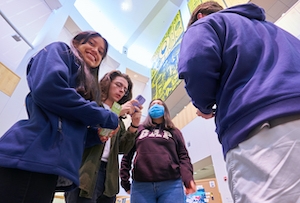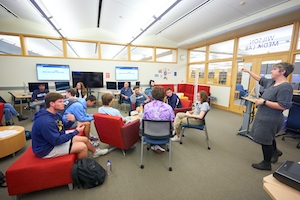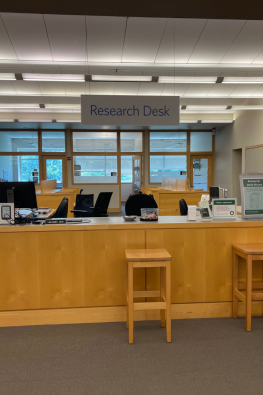General Advice
We’ve been working with faculty on Information Literacy for decades. Here’s what we’ve learned about what works well.
Ready to get started? Contact a librarian! You can also read our workshop ideas and assignment ideas for more specific suggestions for how to get started.
1. Start by getting an overview of options from your librarian. We can lead research workshops, meet with students individually, create online guides, and provide assistance with assignment design and academic integrity support.
2. Ask your librarian for feedback while you are creating your syllabus. We can help you create classroom activities and assignments that will knit together the subject matter of your course, the development of research skills, and a broader understanding of how to find, evaluate, and use information.
3. For maximum impact, request at least two library instruction sessions for First-Year Seminars. The first session can be an orientation to the physical spaces of the library. The second allows students to do meaningful research after having gained familiarity with research databases and tools.

The first session can be an orientation to the physical spaces of the library.
4. Hold a workshop with Special Collections to have students learn how and when to use primary versus secondary sources. Bringing students to Special Collections in a First-Year Seminar, will likely make them more comfortable with the research process for primary sources: how to request items to view, how to handle them etc.
5. Include your librarian’s name and contact info in your syllabus and refer students to your librarian in class and during office hours. Make sure students know that some of the most successful students consult librarians for help with refining research topics, searching, and citing sources.

Some of the most successful students consult librarians.
6. Be clear and specific about your expectations for research assignments. When librarians receive questions from students, the first thing we do is refer to the assignment. What kinds of sources (scholarly, popular, primary, secondary…) should be used? Is there a preferred citation style? Is there a sample paper that can be consulted as a model?
7. Learn about the library skills of incoming students by asking your librarian what kinds of questions students ask. You might be surprised to learn that students aren’t always as confident about using the library as they first appear.
8. Help your students avoid poor papers based on last minute research by assigning a bibliography in advance of a more complex research paper.
Brainstorm with a librarian
When you’re to start planning a research workshop, contact your library liaison.
Or, chat with any librarian at the Research Desk!
Research Desk
- Email:
- ResearchDesk@middlebury.edu
- Tel:
- (802) 443-5496
- Office:
- Davis Family Library


